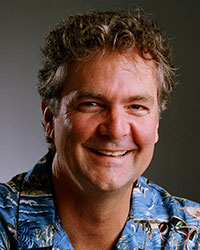Keynote Speaker
David Haussler - U.C. Santa Cruz
Scientific Director, Genomics Institute
Bio: A distinguished professor of biomolecular engineering, David Haussler has led UC Santa Cruz to global prominence in genomics. His UC Santa Cruz research team assembled and posted the first working draft of the genome on the Internet on July 7, 2000, thereby ensuring the human genome would exist forever in the public domain. In the past decade, research based on the genome has increased exponentially, due in large part to the UCSC Genome Browser. Our deep experience in data visualization and analysis makes the database not just a storehouse of information, but a dynamic tool and gateway for scientific discovery. In 2012 the National Cancer Institute selected UCSC to house the data for its genomic programs. The resulting UC Santa Cruz Cancer Genomics Hub is the first Trusted Partner of the NIH for distributing patient genomics data that require restricted access due to privacy concerns. Oncologists and researchers quickly seized on the hub to identify commonalities in cancers, visualize data, and test theories. Haussler co-founded the Genome 10K project so science can learn from other vertebrate genomes, co-founded the Treehouse Childhood Cancer Initiative to enable international comparison of childhood cancer genomes, and co-founded the Global Alliance for Genomics and Health (GA4GH), through which research, health care, and disease advocacy organizations have taken the first steps to standardize and enable secure sharing of genomic and clinical data. He co-chairs the GA4GH Data Working Group. David shares the 2015 Dan David Prize.
"California Kids Cancer Comparison project"
Abstract: Each year 500 California children with cancer either lack or fail to respond to standard therapies. The California Kids Cancer Comparison project led by the UC Santa Cruz Genomics Institute is one of two demonstration projects selected in 2015 by the California Initiative to Advance Precision Medicine, a public-private effort launched by Governor Edmund G. Brown Jr. The initiative is being hosted by UC San Francisco, in conjunction with UC Health, which comprises the University of California's five medical centers. Pediatric clinical trials currently underway at UC medical centers are starting to employ genomic analysis to identify new therapies for incurable tumors. So far these efforts yield new treatment possibilities for less than 10% of patients, in part because each tumor is analyzed on its own. The California Kids Cancer Comparison (CKCC) project, led by the UC Santa Cruz Genomics Institute, provides the power of large-scale bioinformatics to improve this outcome. It analyzes each patient’s tumor in the context of thousands of pediatric and adult tumors that have undergone similar characterization. This project features an application that uploads, analyzes, and communicates genomic information and associated data among patients, advocates, clinicians, and researchers. It handles identifiable clinical and genomic data in a manner protecting patient privacy. To help rapidly bring state-of-the-art analyses to our clinical collaborators, our team includes UC researchers and physicians in partnership with biotech and computer companies. The concept can be scaled and applied to adult cancers as well.
